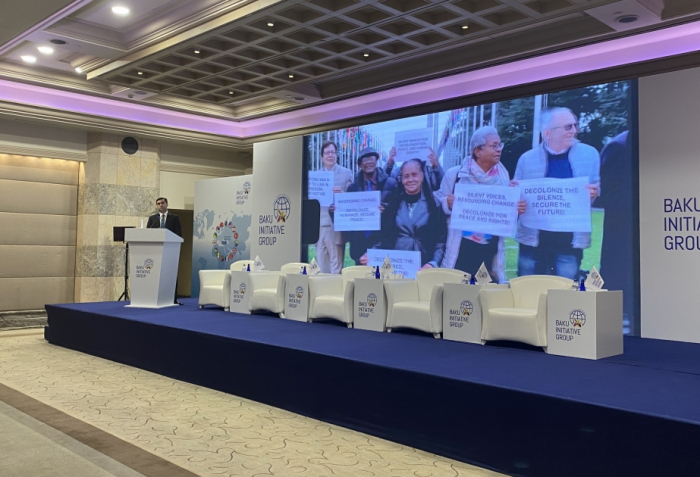On February 24, participants of the international conference on “Decolonization: Awakening of the Renaissance” in Istanbul, Türkiye, organized by the Baku Initiative Group (BIG), addressed a letter to French President Emmanuel Macron expressing their deep concern over the colonial yoke of the peoples of Polynesia, Corsica, Melanesia, the Caribbean and the Antilles.
The letter emphasizes that after the signing of the Charter of the United Nations (UN) in 1945, the international norms of self-governance began to develop thanks to the review by the UN General Assembly of the conditions required for self-determination and decolonization. It is noted that relevant resolutions were adopted by the UN General Assembly in 1946-1960 and a global consensus on these international principles emerged. In 1960, the process was accelerated by the adoption of the historic declaration on decolonization (Resolution No. 1514), followed by Resolution No. 1541. These developments gave an impetus to the independence movement of countries in colonial territories.
It is further pointed out that although 64 years have passed since the adoption of the above-mentioned historic resolution, the peoples of Polynesia, Corsica, Melanesia, the Caribbean and the Antilles are still subjected to new manifestations of colonialism.
The letter notes that the main goal of the Baku Initiative Group, which was established as an international non-governmental organization in 2023, is to support the fight against colonialism and neocolonialism.
Numerous international conferences organized by the Baku Initiative Group exposed ample firsthand information by independence supporters and nationalists of Polynesia, Corsica, Melanesia, the Caribbean and the Antilles about discrimination in employment, housing, exploitation of natural resource and other areas, including mass emigration organized under the auspices of the French government.
For example:
- The deliberate implementation of a poor economic development strategy in certain countries, which involves excessive food dependence of the population (more than 80 percent of food products come from France) and a high cost of living to meet the interests of French monopolies; poverty (50 percent of the population of French Guiana lives below the poverty line), mass unemployment and all kinds of abuses (violence, arms and drug trafficking) in order to seriously jeopardize the future of these territories;
- Non-ratification of Convention No. 169 of 1989 on Indigenous and Tribal Peoples related to Guyana;
- The institutions of French cultural hegemony, the gradual disappearance of local languages and the application of a policy of assimilation to our children, which involves the teaching of the French school curriculum to our children and does not correspond to the history, geography, culture and the future ambitions of our peoples;
- Land grabbing (90 percent of French Guiana belongs to the French state), control over millions of square kilometers of our Exclusive Economic Zones (EEZ) (which makes France the second biggest sea power in the world with 11 million square kilometers of EEZ) and decades of a policy of deportation of our youth to France for settlement colonization of Guadeloupe and Martinique, which has greatly contributed to an unprecedented demographic crisis and the plundering of natural resources;
- The creation of a two-tier colonial justice system that criminalizes all resistance movements and protects bribe-takers (chlordecone poisoning in Martinique and Guadeloupe and the arrest of young people fighting against land occupation, creation of exclusive jurisdictions for the Corsicans in order to try them without recognizing their status as political prisoners and conditions of their imprisonment);
- An “empty chair” policy since Polynesia was re-incorporated into the list of countries to be decolonized;
- Use of the territories from the Indo-Pacific zone (Polynesia, New Caledonia), as well as the Caribbean-American zone (French Guiana, Martinique, Guadeloupe) and Corsica (Solenzara base) as military bases for war preparations without any consultation with local peoples whatsoever;
- Failure to comply with the decolonization process initiated under the Noumea Accord, thus holding an illegal referendum and reducing the number of voters.
It was also emphasized that, realizing their responsibility to history and their own peoples, representatives of the organizations of Polynesia, Corsica, Melanesia, the Caribbean and the Antilles, the last colonies of France, as well as the Baku Initiative Group, demanded that President Macron prevent the actions of the French government against international rules and practices.
“We emphasize the need to establish an international expert group under the auspices of UNESCO and immediately send it to the relevant territories to prepare a report on the state of the cultural and religious heritage of local peoples.”
“We call on the French government to request the dispatch of a special OSCE mission in order to study the situation in the fields of environment, economy, human rights and rights of indigenous peoples on the ground.”
“At a time when the humanity is faced with the implications of global warming and unprecedented dangers that threaten the future, we ask you (President Macron - ed.) to respect the provisions of the UN Charter and the International Covenant on Civil and Political Rights,” the letter emphasizes.
More about:
















































